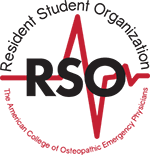Clairisse Hafey, OMS III
LECOM- Bradenton
What to Wear: Business casual is recommended.
What to Expect: This year the ACOEP Residency Fair will be expecting 25-30 ACGME residency programs from various parts of the country that are traditionally “DO-friendly”. Each program will send a combination of representatives, including residents and program directors who will be at each table to meet you and answer any questions that you may have. Programs typically offer brochures and free goodies to entice students to their booth.
Do Your Research: If there is a specific program that you are interested in, it’s a great idea to research that program online ahead of time before introducing yourself at the residency fair. This way, questions can be directed and more personal. For example, if a student reads that an EM residency hospital takes in a high volume of pediatric patients, the student may then inquire about the program’s connections (if any) to pediatric fellowship programs.
Examples of Questions to Ask Programs:
What is your ACGME status?
Do you have any fellowship opportunities? If so, what are they?
What types of institutions do residents typically work at after completing your program?
What is the percentage of pediatric patients seen?
Are there skills labs offered?
Are there resident run lectures?
Does the program have a budget for attending conferences?
Does the program provide childcare?
Are there any wellness workshops?
What is the patient population?
Are there adequate interpreter services?
How are the relationships with ER doctors and other specialties in the hospital?
If there are other residencies at the institution, are procedure priorities given to those residents?
Specific Advice for Each Medical Student Level
- 1st Year
Take the time to soak it all in! Check out some programs and start to network and develop relationships. This is the time to start getting excited about your future in emergency medicine!
- 2nd Year
If this is your first year attending the fair, take it all in and observe those around you, especially the third years. You can also take the time to start building relationships with programs that you are interested in. To give you some extra motivation for doing well on your first set of boards, ask programs about target USMLE Step 1 or COMLEX Level 1 scores that usually grant students an interview.
- 3rd year
This is an important year to continue building relationships with programs that you have interest in. It’s also a good time to discuss audition rotation opportunities that would be available to you during your 4th year. Determine if programs accept VSAS or if they prefer to be applied to independently.
- 4th Year
As your applications are already sent in with ERAS, this is the time to really network and sell yourself to programs. Sometimes, programs may take a second look at your application if you have not yet been offered an interview. If you have been offered an interview, make sure to also stop by and introduce yourself! It can ease some nerves to develop a good rapport before a formal interview in the near-future. Networking is an important skill, so make sure to impress!
Some Advice for All Students:
This is not the interview: …So try not to stress! This is a more informal way to really get to know the programs that you are interested in with a relaxed environment.
And Above All… be yourself! I cannot stress this enough! At the end of the day, program directors and residents want to work with people who they like. As a future resident you also want to work with people who you will get along with. Staying true to yourself is the best way to shine as a candidate and as a human being.
